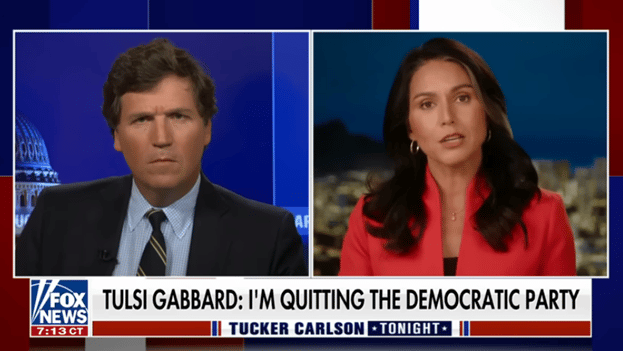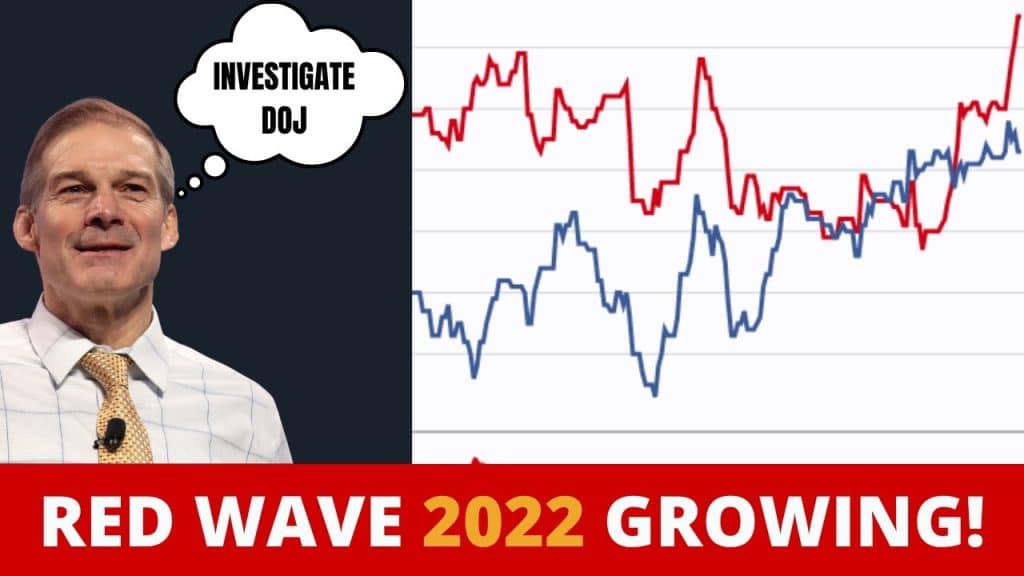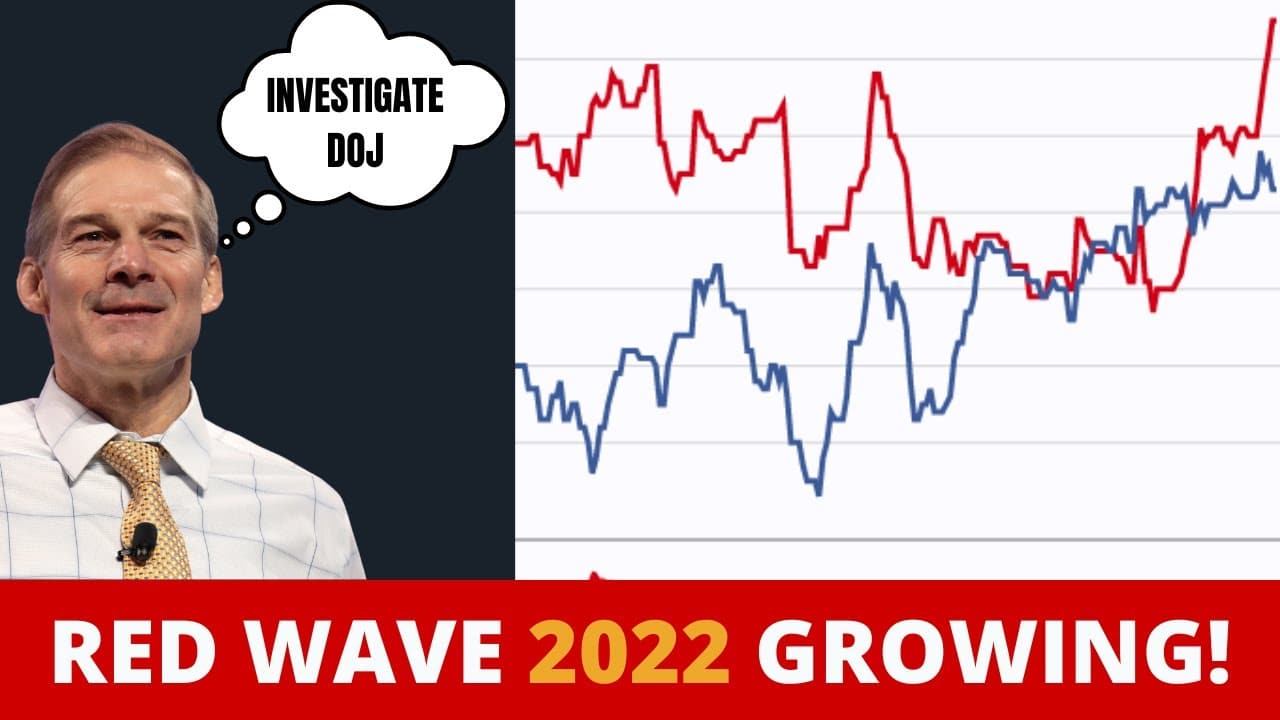Oct. 19, 2022
Permission to republish original opeds and cartoons granted.
Anti-intervention independents lead opposition to Ukraine in NATO (and nuclear war), poll says, as Tulsi Gabbard signals wave

By Robert Romano
18-29-year-olds and 30-44-year-olds are both more likely than 45-54-year-olds and those 65-years-old and older to oppose Ukraine joining NATO as Russia’s invasion of Ukraine wears on, and are a lot more likely to say they not sure, an Oct. 1 to Oct. 4 Economist/YouGov poll found on the issue.
21 percent of 18-29-year-olds oppose Ukraine joining NATO, and 42 percent are not sure. And 22 percent of 30-44-year-olds say no and 39 percent are not sure. Just 37 percent and 39 percent say yes, respectively.
The tepid support is likely because if Ukraine were to join the alliance, it would appear to immediately trigger war with Russia at the same time the Russian president, the Ukrainian president and the American president have all been publicly musing about the increased likelihood of nuclear Armageddon stemming from the war in Ukraine. Under Article 5 of the NATO treaty, “The Parties agree that an armed attack against one or more of them in Europe or North America shall be considered an attack against them all and consequently they agree that, if such an armed attack occurs, each of them… will assist the Party or Parties so attacked…” If Ukraine were permitted to join NATO, the U.S. and NATO would immediately be in another world war.
That said, the older one gets, the weaker opposition to Ukraine in NATO and the stronger support becomes, with just 15 percent of 45-54-year-olds and 14 percent of 65-year-olds saying no to Ukraine in NATO, and 51 percent and 61 percent saying yes, respectively. Another 34 percent and 25 percent are not sure.
Of importance to American electoral politics, 42 percent of independents said they are not sure whether the U.S. should approve Ukraine joining NATO. Only 38 percent say yes, and another 21 percent say no.
Republicans are also far less likely to support Ukraine in NATO, with 24 percent saying no and 34 percent saying they are not sure. And Democrats are more likely to support it, with 65 percent saying yes and only 8 percent saying no and 27 percent saying they are not sure.
That makes Democrats the war party in Washington, D.C. — and it has prompted former U.S. Rep. Tulsi Gabbard to leave the Democratic Party, telling Fox News’ Tucker Carlson on Oct. 11, “President Biden and leaders in Congress [are making] decisions are actively pushing us to the brink of a nuclear holocaust of which they may have their bunkers where they will be safe, but the American people will have no shelter, no place to go, no place to hide, and face the consequences that could destroy all of humanity in the world.” Here, Gabbard was signaling to anti-war Democrats and independents concerned about war that it is okay to not vote Democrat this year, potentially signaling a wave at the polls.
The question to voters came as Ukrainian President Volodymyr Zelensky had requested fast-track approval of Ukraine’s application to be in NATO on Sept. 30, saying that it was already a members: “De facto, we have already made our way into NATO.”
Under Article 10 of the NATO Treaty, “The Parties may, by unanimous agreement, invite any other European State in a position to further the principles of this Treaty and to contribute to the security of the North Atlantic area to accede to this Treaty.”
In May, both Finland and Sweden moved to become latest members of the military alliance, which has already been approved by Canada, Iceland, Norway, Estonia, the UK, Albania, Denmark, Germany, Netherlands, Luxembourg, Bulgaria, Latvia, Slovenia, Croatia, Poland, Lithuania, Belgium, Romania, North Macedonia, Montenegro, France, Italy, the U.S., Czech Republic, Greece, Portugal, Spain and Slovakia.
Only Hungary and Turkey remain to approve both countries into the alliance, with the U.S. meeting most recently with leaders in Istanbul to move the treaty expansion along, where the White House issued a statement on Oct. 2 that the parties had “discussed… progress on NATO accession for Finland and Sweden.”
As for Russia, In a Feb. 22 televised speech justifying Russia’s actions in Ukraine, Russian President Putin plainly said “Ukraine joining NATO is a direct threat to Russia’s security.”
If President Biden were to admit Ukraine into NATO, thus modifying the treaty, Congress would not even need to authorize the use of military force in order to get into a wider war. The consequential vote would be on adding Ukraine into NATO via a Senate vote.
For now, Biden quietly poured cold water on Kiev’s request to join the alliance with White House National Security Adviser Jake Sullivan telling reporters on Sept. 30, stating, “the process in Brussels should be taken up at a different time.”
Likely underscoring that the U.S. from a policy perspective is treating Ukraine in NATO as a proxy for nuclear war, which the White House sees as an increasing likelihood. On Oct. 6, Biden said at a Democratic fundraiser that “[Putin] is not joking when he talks about the potential use of tactical and nuclear weapons…” In an Oct. 11 interview with CNN’s Jake Tapper, Biden ominously warned that nuclear escalation could be inevitable if Russia uses a tactical nuclear weapon in Ukraine: “The mistakes get made. And given them — and the miscalculation could occur. No one can be sure what would happen, and it could end in Armageddon.”
Given the stakes on the ground, the treaty triggering the end of the world issue still sounds like a faraway prospect, if not a frightening one. In the meantime, the prospects of war appear to weighing heavily on the minds of U.S. voters with the November Congressional midterms and other statewide elections, with anti-intervention independent voters fleeing war—and Democrats.
Robert Romano is the Vice President of Public Policy at Americans for Limited Government Foundation.
Video: Republicans Take Commanding Lead in Race for Congress

To view online: https://www.youtube.com/watch?v=aenSNqfLKus

